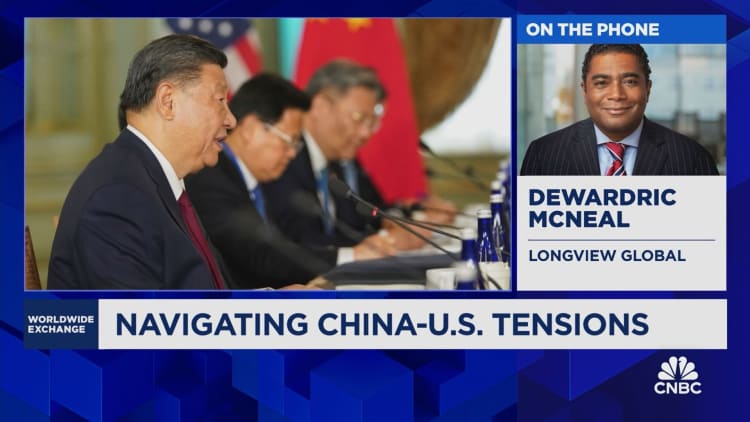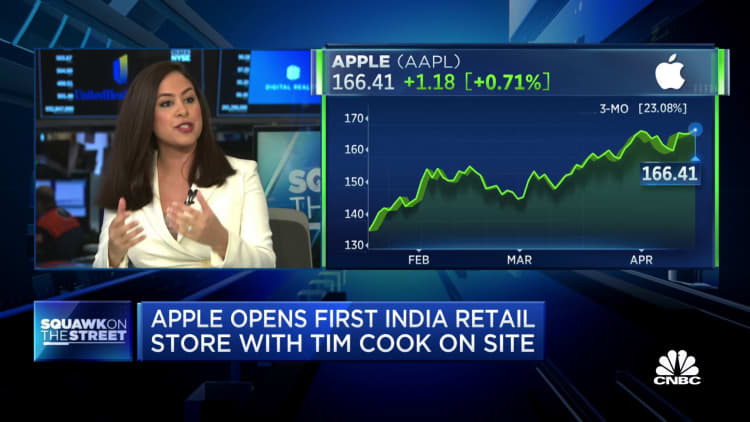
There's been a recent uptick in U.S. CEOs making treks to China in search of favor and foothold. This ritual, epitomized by high-profile engagements — such as Apple CEO Tim Cook's effusive overtures and statements of commitments to China — signals that American corporate titans think the strategy can still work. It won't. It's a strategic play drawn from an antiquated playbook.
In an increasingly difficult geopolitical environment — especially for tech companies caught in a high stakes rivalry between the U.S. and China — showering praise on China makes some sense. The approach is rooted in a history of success. For decades, the formula seemed straightforward: show up, show respect, and pledge high investment in China, and in return, hope to gain access to the perceived vast markets and manufacturing prowess.
Tim Cook's recent sojourn in China, including pledges of increased investment and the expansion of research and development facilities, exemplify this tried and tested strategy. Tim Cook's narrative of China as "critical" to Apple, coupled with his admiration for the country's advanced manufacturing capabilities, embodies the ethos of this engagement playbook.
Boeing was a previous example. During a different era when China needed Boeing, and Boeing was not bedeviled by the current set of problems, its CEOs engaged with China frequently helping to secure significant aircraft orders. A pivotal moment came in 2011, when then-CEO Jim McNerney visited China, leading to substantial deals for Boeing that touched off a massive race for orders between Boeing and Airbus. That trip underscored how impactful and important high-level CEO engagements used to be in fostering long-term business relationships and deals in China.
Volkswagen's venture into China in the early 1980s, establishing its first joint venture, is another hallmark of successful engagement. The strategic move not only granted Volkswagen a first-mover advantage but also set a precedent for foreign direct investment in China, demonstrating the potential benefits of early and often CEO engagement in those days.
But the approach has run its course. It is no longer fit for purpose in an era of intense bilateral economic competition, geopolitical tensions, technological rivalries, and a profound reshaping of the global economic landscape. CEOs who continue to bet on this strategy should expect diminishing marginal returns, particularly under Xi Jinping's leadership.
Loading chart...
Despite frequent high-level visits and engagements, tech companies like Qualcomm have faced increasing regulatory challenges and fines in China, underscoring the limits of corporate diplomacy, particularly for the technology sector. It can be argued that the turning point came long ago, with Google's high-profile exit from China in 2010, despite previous attempts by its CEOs to engage with Chinese authorities. The challenges faced by Google underscore the complexities of operating in China under its stringent regulatory environment, regardless of adroit high-level CEO diplomacy.
The Facebook case is particularly instructive. Meta CEO Mark Zuckerberg went to notable lengths to court China, demonstrating a willingness to engage deeply with Chinese culture and business practices. He learned Mandarin and used it to communicate during public appearances and meetings in China. He was photographed jogging through Tiananmen Square in Beijing. These actions were part of a broader strategy to make Facebook palatable to Chinese authorities and gain entry into the lucrative Chinese market. But despite Zuckerberg's concerted efforts, Facebook remains blocked in China, with the Great Firewall preventing access to the platform. The Chinese government's stringent control over the internet and social media, coupled with its push to support domestic social media platforms like Weibo and WeChat, created a nearly insurmountable barrier.
In this environment, Tim Cook's attempts to pull out all the stops will not be rewarded over the long-term. It's not that the Apple CEO is doing anything wrong. He is executing textbook corporate diplomacy. The problem is that in this environment, not only does China have concerns about Western tech and Western companies, but the China of today also has formidable options to replace foreign companies with its own champions. That makes the playbook a limited impact one for advancing the interests of foreign businesses over the long-term, given how much has changed since Volkswagen and Boeing and others pioneered the high-flying CEO visit to China strategy.
Despite Cook's efforts, Apple faces declining sales in China, a testament to the growing domestic competition, security concerns about foreign hardware and software, and an increasingly nationalistic and patriotic Chinese consumers. The resurgence of domestic champions like Huawei, buoyed by the new nationalistic fervor and government support, illustrates a market increasingly resistant to foreign dominance.
Strategic alignment with China's market and technological ambitions risks ensnaring companies in the crossfires of the escalating trade and technology wars between the U.S. and China. This battleground, marked by efforts to control emerging technologies with potential military applications, presents a perilous terrain for companies caught between nationalistic policies and their own global market aspirations.
Xi is determined to remake China's market dynamics but also to win the struggle for technological supremacy. The pride associated with domestic achievements in technology, exemplified by Huawei's breakthroughs and the global reach of platforms like TikTok, AliExpress, and Shein, underscores a burgeoning sentiment of economic and technological nationalism. This landscape poses a stark challenge for foreign firms attempting to maintain, grow or align themselves with China's economic and technological future growth while also maintaining favor with their own governments, markets, and domestic consumers.
While it's tempting to interpret China's latest round of outreach to foreign CEOs and foreign investors as a fundamental shift in viewpoint by the Chinese leadership, it is more accurately a tactical adaptation in response to current economic challenges, not a reversal of Xi Jinping's long-term strategic goals. The emphasis on national security and self-sufficiency, especially in critical strategic sectors, remains paramount. What we're observing is a pragmatic short-term adjustment rather than a significant "Great Pivot" in China's overarching approach.
In this context, the continued reliance on old strategies reveals not just a failure to adapt but a potential underestimation of the shifting dynamics at play. CEOs visiting China, while aiming to secure their companies' futures, must recognize the dual reality of opportunity and obsolescence. The approach needs a recalibration: a blend of strategic engagement with China combined with rigorous de-risking and diversification efforts. This strategy acknowledges the potential benefits of the Chinese market while preparing for the volatilities, uncertainties, and increased competition by China's own companies and global brands.
If these CEOs must travel, then engagements with Chinese leadership, including Xi Jinping and Premier Li Qiang, should transcend the exclusive pursuit of favorable press and glittery narratives, and should instead include time for a hard-nosed discussion about concrete policies, policy clarifications in a highly muddled policy environment, and above all press for actions that safeguard foreign business interests. This dialogue is crucial, not just for immediate operational clarity but as a foundational step towards a more resilient and adaptive strategy.







